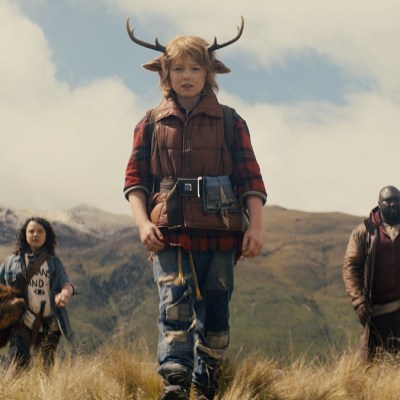Why Sweet Tooth Created a Friendlier Apocalypse
Netflix’s Sweet Tooth sought to change the nature of grim post-apocalyptic storytelling. And that’s even before the global pandemic arrived.

This article contains spoilers for Sweet Tooth.
Sweet Tooth executive producer Beth Schwartz enjoys killing her sister.
Wait, sorry, left a bit of important context out of that! Schwartz enjoys killing characters named after her sister, Nancie, in the projects she works on. The iteration of Nancie who bites the dust in Netflix’s charming post-apocalyptic adventure is a nosy neighbor who goes out of her way to make sure everyone in her locked-down community is following quarantine rules. That would seem harmless enough if it weren’t for the fact that anyone who doesn’t do so is burned alive in their own home. Nancie is ultimately killed by a swift kick to the chest by Dr. Aditya Singh’s (Adeel Akhtar) horse.
“(Nancie’s) a huge fan of horror films so I like to kill her in everything,” Schwartz says. “She texted me saying how much she loved her death (in Sweet Tooth), but she wanted it to be a little more gory. That was her note.”
Nancie may have preferred a gorier death in Sweet Tooth, but the series doesn’t have a lot of gore to pass around. Despite taking place in a dismal post-apocalyptic society ravaged by a virus, the show based on Jeff Lemire’s comic of the same name doesn’t feature a lot of violence. Sure, there is plenty of implied gore, like when the Big Man Tommy Jepperd (Noso Anozie) uses a bear trap as a melee weapon (that was rad). For the most part, however, Sweet Tooth avoids the uncomfortable conversations about humanity’s penchant for violence raised by its comic source material and other post-apocalyptic storytelling.
According to Schwartz and fellow executive producer Jim Mickle, that was all by design.
“That question came up of, ‘who is this for?’ You start to look at (other post-apocalyptic) shows and I couldn’t really find a similar thing,” Mickle says. “Then as time went on the world was in a dark place and it was like ‘do audiences want to spend the next few years being thrust into a world onscreen that was going to be so melancholic?’”
The world has indeed become a bit more melancholic since Lemire’s comic about a world-ending virus and the arrival of animal-human hybrids was first published in 2009. Back then AMC’s The Walking Dead had not yet premiered its first episode and the post-apocalyptic storytelling renaissance was a ways away…perhaps because the apocalypse itself felt particularly far away.
Now, the world that Sweet Tooth’s cheerful first season arrives into is coming off the heels of a pandemic that many viewers could be forgiven for thinking inspired the show. It did not, of course, given the timelines involved but the series still felt the effects of the COVID-19 pandemic anyway, having to halt its New Zealand production mid-filming. In 2021, it seems like there’s always an apocalypse of sorts underway somewhere, which is something that actor Neil Sandilands (who plays the villainous General Abbott) notes.
“I get a little bit clumsy around those ideas of ‘post-apocalyptic’,” Sandilands says. “What is that supposed to mean, ‘dystopian future’? Who says we’re not living in the apocalypse right now? Is this utopia that we’re living in now? Everything around me seems pretty messed up.”
That’s why Sweet Tooth endeavored to put a friendlier face on the end of world, which was a change endorsed by Lemire.
“I created the book a decade ago but since that time, the world’s changed a lot,” Lemire says. “Talking to Jim (Mickle) early on, I knew that he loved the book, got all the right elements of the book, and was passionate about them. So I felt like it was in good hands.”
One of the inherently optimistic aspects of the comic that Mickle latched onto was lead character Gus a.k.a. Sweet Tooth.
“The thing about him in the book is that you can’t get him down, ever. That sort of became the North Star for the show in a way,” Mickle says.
As portrayed by young actor Christian Convery in the series, Gus a.k.a. Sweet Tooth remains the story’s beacon of positivity. The deer-boy hybrid simply wants to find his mother and the opportunity to do so in a virus-ravaged wasteland is an adventure, not a burden. The effect of the writers’ tonal alterations combined with Convery’s natural charm creates a new kind of apocalyptic storytelling experience…one that hews closer to kid-friendly Amblin Entertainment titles of the ‘80s rather than our current, more pessimistic fare.
Of course, the world of Sweet Tooth, the TV show, is not without danger and the world of Sweet Tooth, the comic, is not without joy. In the end, no good story can exist without a little bit of both.
“I feel like in the end, even though the tone may have shifted, the heart of the story is still very much the same as the comic,” Lemire says. “It’s still the story of Gus and his journey. It’s been a fantastic thing to see people latching onto the story and to these characters again.”
All eight episodes of Sweet Tooth are available to stream on Netflix now.

